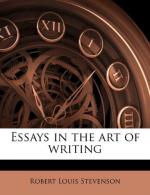the idea of the Chevalier Burke for a narrator.
It was at first intended that he should be Scottish,
and I was then filled with fears that he might prove
only the degraded shadow of my own Alan Breck.
Presently, however, it began to occur to me it would
be like my Master to curry favour with the Prince’s
Irishmen; and that an Irish refugee would have a particular
reason to find himself in India with his countryman,
the unfortunate Lally. Irish, therefore, I decided
he should be, and then, all of a sudden, I was aware
of a tall shadow across my path, the shadow of Barry
Lyndon. No man (in Lord Foppington’s phrase)
of a nice morality could go very deep with my Master:
in the original idea of this story conceived in Scotland,
this companion had been besides intended to be worse
than the bad elder son with whom (as it was then meant)
he was to visit Scotland; if I took an Irishman, and
a very bad Irishman, in the midst of the eighteenth
century, how was I to evade Barry Lyndon? The
wretch besieged me, offering his services; he gave
me excellent references; he proved that he was highly
fitted for the work I had to do; he, or my own evil
heart, suggested it was easy to disguise his ancient
livery wit a little lace and a few frogs and buttons,
so that Thackeray himself should hardly recognise
him. And then of a sudden there came to me memories
of a young Irishman, with whom I was once intimate,
and had spent long nights walking and talking with,
upon a very desolate coast in a bleak autumn:
I recalled him as a youth of an extraordinary moral
simplicity—almost vacancy; plastic to any
influence, the creature of his admirations: and
putting such a youth in fancy into the career of a
soldier of fortune, it occurred to me that he would
serve my turn as well as Mr. Lyndon, and in place
of entering into competition with the Master, would
afford a slight though a distinct relief. I
know not if I have done him well, though his moral
dissertations always highly entertained me: but
I own I have been surprised to find that he reminded
some critics of Barry Lyndon after all. . . .
PREFACE TO ‘THE MASTER OF BALLANTRAE’ {19}
Although an old, consistent exile, the editor of the
following pages revisits now and again the city of
which he exults to be a native; and there are few
things more strange, more painful, or more salutary,
than such revisitations. Outside, in foreign
spots, he comes by surprise and awakens more attention
than he had expected; in his own city, the relation
is reversed, and he stands amazed to be so little
recollected. Elsewhere he is refreshed to see
attractive faces, to remark possible friends; there
he scouts the long streets, with a pang at heart,
for the faces and friends that are no more.
Elsewhere he is delighted with the presence of what
is new, there tormented by the absence of what is old.
Elsewhere he is content to be his present self; there
he is smitten with an equal regret for what he once
was and for what he once hoped to be.




